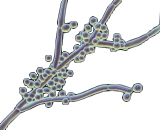Candida albicans is an opportunistic pathogenic yeast that is a common member of the human gut flora. It does not proliferate outside the human body. It is detected in the gastrointestinal tract and mouth in 40-60% of healthy adults. It is usually a commensal organism, but can become pathogenic in immunocompromised individuals under a variety of conditions. It is one of the few species of the Candida genus that causes the human infection candidiasis, which results from an overgrowth of the fungus. Candidiasis is for example often observed in HIV-infected patients. C. albicans is the most common fungal species isolated from biofilms either formed on (permanent) implanted medical devices or on human tissue. C. albicans, C. tropicalis, C. parapsilosis, and C. glabrata, are together responsible for 50–90% of all cases of candidiasis in humans.

